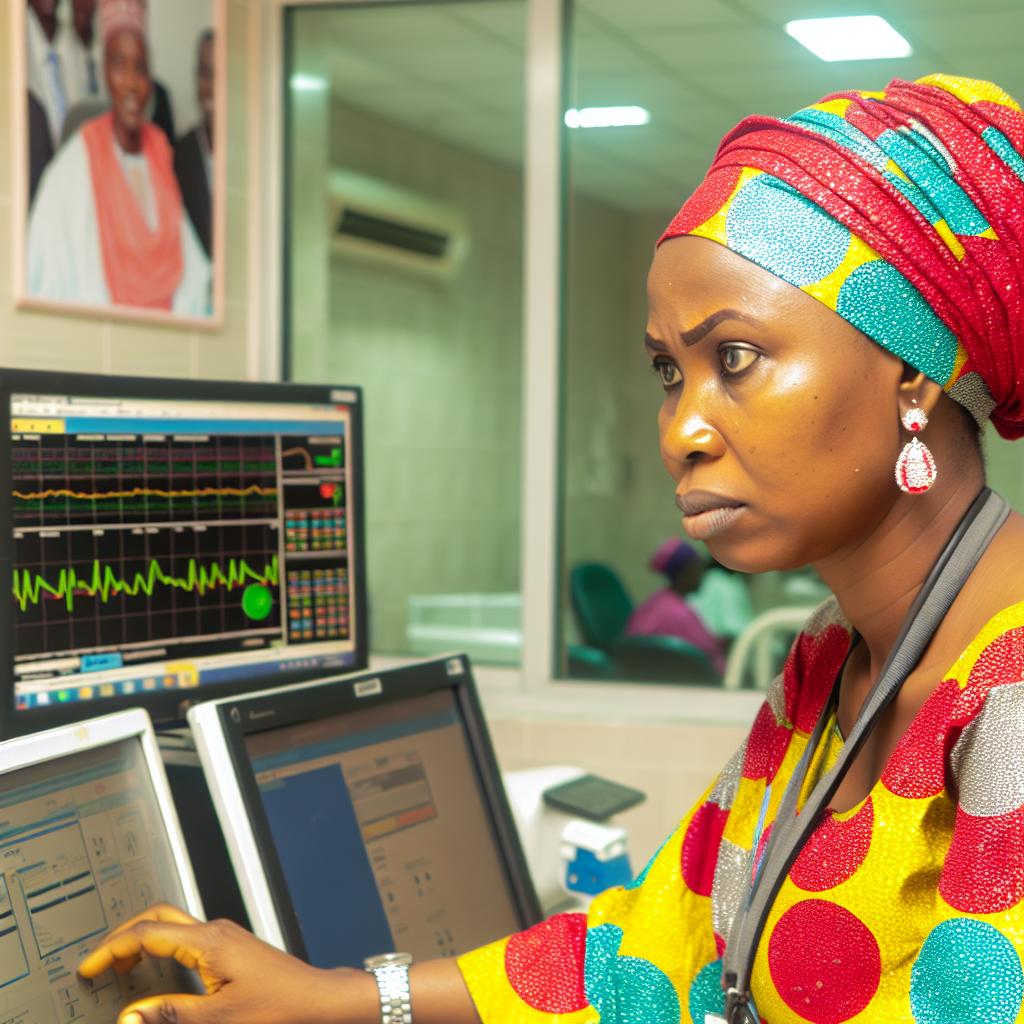Introduction
Preventive medicine in Nigeria focuses on promoting health and preventing diseases.
This approach targets the prevention of diseases before they occur.
Technology has played a vital role in transforming healthcare delivery in the country.
With the integration of technology, healthcare providers in Nigeria can leverage various digital tools.
These tools enhance preventive medicine practices and improve healthcare accessibility.
This makes healthcare more efficient for the population.
The thesis statement of this blog post is to explore the significant role of technology in preventive medicine in Nigeria.
The post highlights its importance in improving healthcare outcomes and overall population health.
Current State of Preventive Medicine in Nigeria
- Lack of adequate healthcare infrastructure
- High prevalence of preventable diseases
- Need for innovative solutions to improve preventive measures
Despite efforts to improve healthcare in Nigeria, the current state of preventive medicine still faces significant challenges.
One of the major issues is the lack of adequate healthcare infrastructure across the country.
Many rural areas lack access to basic healthcare services.
This situation makes it difficult to implement preventive measures effectively.
Nigeria has a high prevalence of preventable diseases such as malaria, tuberculosis, and HIV/AIDS.
These diseases continue to burden the healthcare system and contribute to high mortality rates.
There is a pressing need for innovative solutions to address these health challenges.
Improving preventive measures remains a crucial goal for the country.
Challenges in Implementing Preventive Medicine
- Inadequate funding for preventive healthcare programs
- Lack of awareness about preventive measures among the population
- Inefficient data collection and analysis for preventive interventions
One of the main challenges is inadequate funding for healthcare programs.
The government’s budget allocation for preventive health initiatives is often insufficient.
This shortfall leads to a lack of resources for disease prevention efforts.
Another issue is the lack of awareness about preventive measures among the population.
Many Nigerians do not have access to information on basic healthcare practices.
Examples include vaccinations and regular health check-ups.
This lack of knowledge hinders the effectiveness of preventive interventions.
Furthermore, there is inefficient data collection and analysis for preventive interventions.
Without accurate information on disease prevalence and risk factors, developing targeted strategies is challenging.
Role of Technology in Improving Preventive Medicine
- Enhanced data collection and analysis through digital health tools
- Telemedicine for remote healthcare services and consultations
- Mobile health apps for disease tracking and monitoring
Technology plays a crucial role in improving preventive medicine in Nigeria.
It provides innovative solutions to address existing challenges.
Digital health tools enhance data collection and analysis.
These tools allow healthcare providers to gather real-time information on disease trends and risk factors.
Telemedicine offers another technology-driven approach to improving preventive healthcare services.
It enables patients in remote areas to access healthcare services and consultations remotely.
This reduces barriers to healthcare access and increases preventive measures.
Mobile health apps also serve as valuable tools for disease tracking and monitoring.
Individuals can monitor their health status and track symptoms with these apps.
They receive personalized recommendations for preventive measures as well.
By using mobile technology, healthcare providers engage with patients more effectively.
This approach promotes preventive health practices throughout the population.
Future Prospects for Preventive Medicine in Nigeria
- Increased investment in healthcare infrastructure and preventive programs
- Expansion of technology-driven solutions for disease prevention
- Collaboration between public and private sectors for sustainable preventive healthcare initiatives
Looking ahead, there are promising prospects for the future of preventive medicine in Nigeria.
Increased investment in healthcare infrastructure and preventive programs will strengthen the healthcare system.
These investments improve access to quality preventive care nationwide.
Transform Your Career with Expert Guidance
Get personalized mentorship consulting that’s tailored to your unique path. Our expert advice is actionable and exclusive.
Get StartedThe expansion of technology-driven solutions will also play a key role in advancing preventive medicine.
Healthcare providers can develop innovative strategies for disease control and prevention by harnessing technology.
Collaboration between the public and private sectors is essential for sustainability.
Stakeholders working together can leverage resources and expertise effectively.
This collaboration will enable the implementation of effective preventive measures.
Ultimately, such efforts will improve overall health outcomes for the Nigerian population.
Telemedicine and remote patient monitoring
Telemedicine allows healthcare providers to remotely diagnose and treat patients.
This is especially important in rural areas with limited access to healthcare facilities.
Remote patient monitoring enables continuous tracking of patients’ vital signs and health data.
This technology provides timely interventions and reduces hospital visits.
Electronic health records for efficient healthcare delivery
Electronic health records (EHRs) streamline patient information management.
They improve coordination among healthcare providers and enhance patient care.
EHR systems enable quick access to medical history, medications, test results, and treatment plans.
This leads to more personalized and efficient healthcare delivery.
Mobile health applications for health education and promotion
Mobile health applications provide valuable resources for health education.
They also support disease prevention and lifestyle management.
These apps offer features such as symptom trackers, medication reminders, and virtual consultation services.
Users gain access to credible health information, empowering them to manage their health and wellness.
Technology plays a pivotal role in expanding access to quality healthcare services in Nigeria.
It helps improve health outcomes and reduces healthcare disparities across communities.
By leveraging telemedicine, remote patient monitoring, electronic health records, and mobile health applications, providers deliver more personalized healthcare.
This results in more efficient and effective preventive healthcare services nationwide.
See Related Content: Understanding Nigerian Medical School Rankings
In Nigeria, the implementation of telemedicine in remote areas has been a game-changer in the healthcare sector.
Increased Access to Healthcare Services
Telemedicine has bridged the gap between healthcare providers and patients in far-flung regions of Nigeria.
Patients who previously had limited or no access to healthcare services can now consult with specialists in urban areas through telemedicine platforms.
This has significantly improved healthcare outcomes and reduced the burden on physical healthcare facilities.
Early Detection and Intervention for Diseases
One of the key benefits of telemedicine is the timely detection and intervention for various diseases.
Through remote consultations and monitoring, healthcare providers can identify potential health issues early on.
This leads to prompt treatment and management.
This proactive approach has helped in preventing the progression of diseases and improving patient outcomes.
Reduction in Healthcare Costs and Burden on Hospitals
By leveraging telemedicine, healthcare costs have been significantly reduced for both patients and hospitals.
Remote consultations eliminate the need for travel and reduce hospital visits.
This results in cost savings for patients.
Additionally, hospitals can optimize their resources and focus on critical cases.
They thereby reduce the overall burden on the healthcare system.
Impact of Telemedicine on Nigeria’s Healthcare Landscape
The implementation of telemedicine in remote areas of Nigeria has revolutionized preventive medicine.
This technology-driven approach increases access to healthcare services.
It enables early detection and intervention for diseases.
It also reduces healthcare costs and the burden on hospitals.
Ultimately, telemedicine has the potential to transform the healthcare landscape in Nigeria.
It improves the overall health outcomes of its population.
See Related Content: Innovations in Nigerian Oral and Maxillofacial Surgery
Use of Electronic Health Records for Data Management
Electronic Health Records (EHRs) play a crucial role in preventive medicine in Nigeria.
These digital records contain comprehensive health information about patients.
This makes them an invaluable tool for healthcare providers.
- Improved Patient Care Coordination
- Real-time Access to Patient Information for Healthcare Providers
- Enhanced Communication Among Healthcare Teams
EHRs streamline the coordination of patient care by providing a centralized platform.
Healthcare professionals can access and update patient information in real-time.
This ensures all healthcare team members are on the same page regarding a patient’s health status and treatment plan.
EHRs enable healthcare providers to access patient records from any location with internet access.
This real-time access allows providers to make informed decisions quickly.
Consequently, care becomes more efficient and effective.
Centralizing patient information in EHRs helps healthcare teams collaborate more effectively.
Providers can securely share information and communicate about care plans.
All team members stay informed and involved in the patient’s preventive care.
Learn More: Preventive Dentistry and Pregnancy: Key Tips

Integration of Mobile Health Applications for Preventive Care
Mobile health applications have revolutionized the way preventive care is delivered in Nigeria.
These applications offer a wide range of features and tools that empower individuals to take control of their health and well-being.
Here are some key ways in which mobile health applications are being integrated into preventive medicine in Nigeria:
- Health Tracking Tools for Disease Prevention
- Health Education Resources for Communities
- Remote Monitoring of Chronic Conditions for Early Intervention
Mobile health applications provide users with the ability to track various health metrics such as heart rate, blood pressure, and sleep patterns.
By monitoring these metrics regularly, individuals can detect any abnormalities early on and take preventive measures to avoid the onset of diseases.
One of the greatest benefits of mobile health applications is the access to valuable health education resources.
These apps offer informative articles, videos, and infographics on various health topics.
They empower communities with knowledge to make informed decisions about their health.
For individuals with chronic conditions such as diabetes or hypertension, mobile health applications provide remote monitoring capabilities.
Through connected devices and sensors, healthcare providers can track patients’ health data in real-time and intervene at the earliest signs of complications.
By integrating mobile health applications into preventive care strategies, Nigeria is making significant strides in improving healthcare access and outcomes.
These technologies empower individuals to take a proactive approach to their health and well-being.
This approach ultimately leads to a healthier population.
Discover More: Common Child Dental Issues in Nigeria
Challenges in Adopting Technology for Preventive Medicine in Nigeria
- Limited internet connectivity in rural areas
- Lack of technical expertise among healthcare professionals
- Privacy and security concerns with electronic health records
Adopting technology for preventive medicine in Nigeria comes with its own set of challenges.
These challenges need to be addressed to fully leverage the benefits technology offers.
Let us explore key obstacles faced in implementing technology-driven preventive medicine in Nigeria.
Limited Internet Connectivity in Rural Areas
A major hindrance to adopting technology for preventive medicine is limited internet connectivity.
This issue particularly affects rural areas across Nigeria.
Without reliable internet access, healthcare professionals struggle to use digital tools aiding preventive care.
Consequently, this digital divide reduces the reach and effectiveness of technology-based healthcare solutions.
Underserved communities face the worst impact of this connectivity challenge.
Lack of Technical Expertise Among Healthcare Professionals
Another significant challenge is the lack of technical skills among healthcare workers.
Many healthcare professionals in Nigeria lack sufficient training to use and maximize technological tools.
This skills gap affects how smoothly technology integrates into healthcare practices.
The quality of preventive care services tends to suffer as a result.
Privacy and Security Concerns with Electronic Health Records
Privacy and security pose major barriers to adopting technology in preventive medicine.
Electronic health records contain sensitive patient information requiring strong protection.
Without robust data security measures, both healthcare providers and patients may hesitate to embrace digital health solutions.
Fears of privacy violations hamper wider acceptance and adoption.
Addressing these challenges is critical for successful technology implementation in Nigeria’s preventive medicine sector.
By overcoming barriers like limited connectivity, skills shortages, and privacy concerns, healthcare can fully harness technology’s potential.
This advancement can lead to improved preventive care and better public health outcomes.
Role of Technology in Preventive Medicine in Nigeria
Technology plays a significant role in preventive medicine in Nigeria.
Electronic health records contribute to better healthcare management.
Telemedicine expands access to medical consultations across remote areas.
These tools enhance healthcare delivery nationwide.
Increased investment in healthcare technology is necessary.
This investment will improve preventive healthcare measures.
Such advancements support the overall public health system.
The future promises stronger preventive strategies driven by technology.
Ultimately, this improves health outcomes throughout Nigeria.
Additional Resources
Federal Ministry of Health and Social Welfare: HOME
The Lancet Nigeria Commission: investing in health and the future of …




